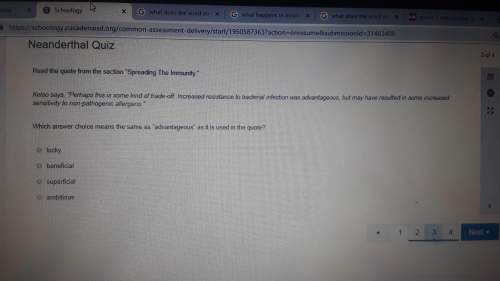
Answers: 2


Another question on English

English, 21.06.2019 18:00
Mr. pontellier did not attend these soirée musicales. he considered them bourgeois, and found more diversion at the club. to madame ratignolle he said the music dispensed at her soirées was too "heavy," too far beyond his untrained comprehension. his excuse flattered her. but she disapproved of mr. pontellier's club, and she was frank enough to tell edna so. which statement best describes the point of view in the excerpt? the third-person point of view is voiced by an objective character in the story. the third-person point of view is voiced by a subjective character in the story. the third-person point of view is an omniscient observer. the third-person point of view is an observer with limited omniscience.
Answers: 1

English, 21.06.2019 19:30
Which of these best identifies the text elements used in this text? a) heading and italics print b) pictures and capitalization c) headings and bold faced print d) capitalization and underlining
Answers: 3

English, 21.06.2019 23:30
Which revision, if any, best fixes the bolded (capitalized in this case) part of the sentence? female cardinals, a somewhat drab bird compared to the males, blend in well with their environment. no change somewhat drab birds a somewhat drab's bird somewhat drab bird's
Answers: 2

English, 22.06.2019 03:30
In just over one hundred years, between 1701 and 1810, 252,500 enslaved africans were brought to barbados—an island that occupies only 166 square miles (making it, today, one of the smallest countries in the world). the english then set out to conquer more sugar islands, starting with jamaica, which they took from spain in 1655. in the same period that the 252,500 africans were brought to barbados, 662,400 africans were taken to jamaica. thus, sugar drove more than 900,000 people into slavery, across the atlantic, to barbados and jamaica—and these were just two of the sugar islands. the english were eagerly filling antigua, nevis, saint kitts, and montserrat with slaves and sugar mills. they took over much of dutch guiana for the same reason. seeing the fortunes being made in sugar, the french started their own scramble to turn the half of the island of hispaniola that they controlled (which is now haiti), as well as martinique, guadeloupe, and french guiana (along the south american coast near dutch guiana), into their own sugar colonies, which were filled with hundreds of thousands more african slaves. by 1753, british ships were taking average of 34,250 slaves from africa every year, and by 1768, that number had reached 53,100. –sugar changed the world, marc aronson and marina budhos how do the authors use historical evidence to support their claim? x(a) they use secondary sources to show how french and english monarchs were indifferent to enslaved people. x(b)they use secondary sources to show that enslaved people often fought for their freedom after arriving in the caribbean. the answer is: (c)they use facts from primary sources to show how countries increased the number of enslaved people to produce more sugar. x(d)they use primary source interviews to show that countries could make more money in trading sugar without using enslaved people.
Answers: 1
You know the right answer?
Which of the following is not a part of cultural competence?...
Questions

Mathematics, 05.05.2020 11:09


English, 05.05.2020 11:09

Geography, 05.05.2020 11:09

Biology, 05.05.2020 11:09


Mathematics, 05.05.2020 11:09

Biology, 05.05.2020 11:09

Mathematics, 05.05.2020 11:09

Biology, 05.05.2020 11:10

Mathematics, 05.05.2020 11:10


Biology, 05.05.2020 11:10

Biology, 05.05.2020 11:10





Mathematics, 05.05.2020 11:10

Mathematics, 05.05.2020 11:10




